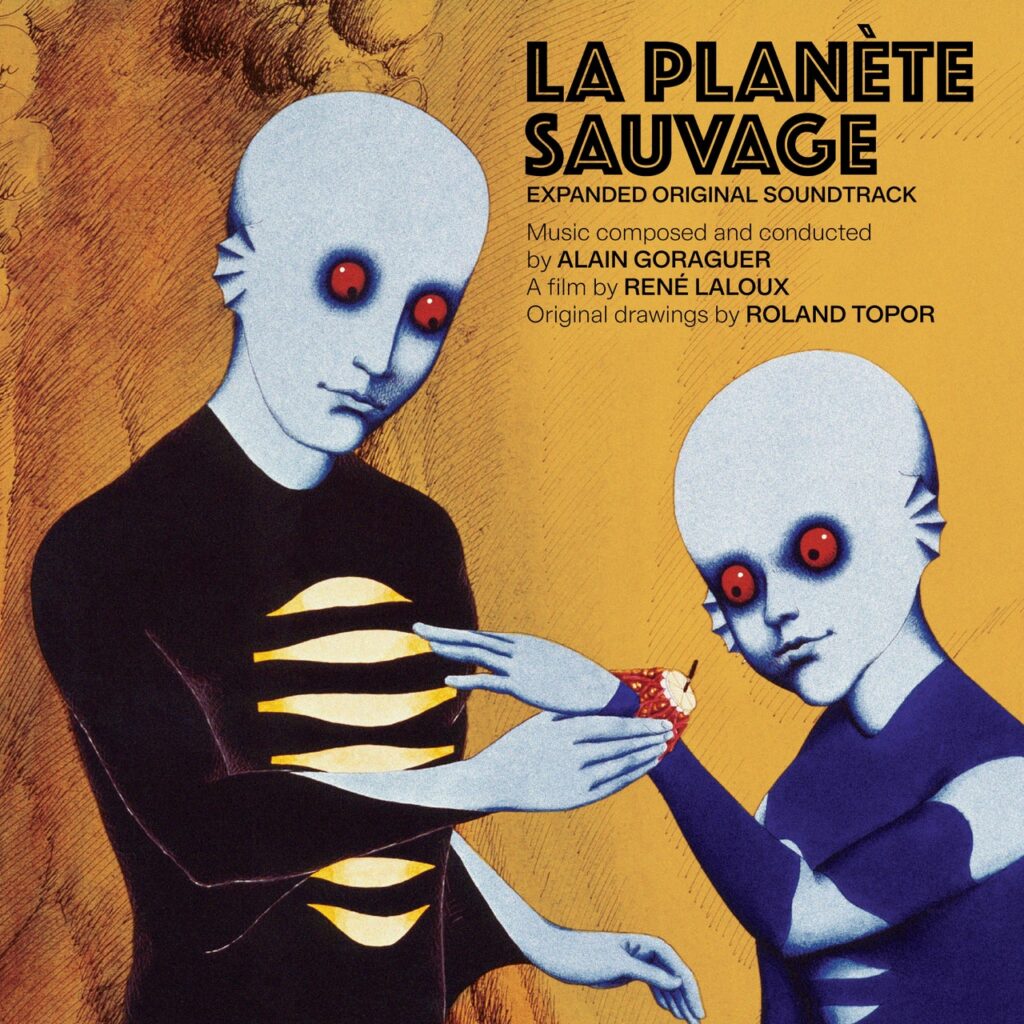While René Laloux’s 1973 animated film La Planète Sauvage (Fantastic Planet) is celebrated for its enduringly shocking, Dali-esque visuals, Alain Goraguer’s soundtrack is a surrealist triumph in itself. Composed for the French-language story of a planet where humans are hunted and domesticated by gigantic blue aliens, its orchestral fusion of jazz, prog rock and modern classical still feels—as the film’s adverts once trumpeted—“Strange! Frightening! Fascinating!”
Goraguer ought to be better known. Born in 1931, he was a go-to arranger for French pop giants like Serge Gainsbourg, Jean Ferrat, and France Gall, but he often avoided the limelight, using pseudonyms like Milton Lewis or Laura Fontaine. Despite the global stardom his music helped others achieve, his death in February of this year went relatively unpublicized. His score for La Planète Sauvage has similarly left a legacy from the shadows, having been sampled by generations of major hip-hop artists. Appearing the summer of DJ Kool Herc’s block party, it was dusted off in the ’90s by KRS One and Big Pun, in the ’00s by Madlib (as Quasimoto) and J Dilla, and over the past decade by Mac Miller, Little Simz, Flying Lotus and Denzel Curry, and Run the Jewels. A new 50th-anniversary reissue—including 10 unreleased cuts—is a fresh reminder that Goraguer’s score is a true avant-garde gem.
Most of the original score’s 25 short pieces refer to two motifs that first appear in the prowling, noirish opener, “Déshominisation (I)”: a descending melody and a twanging bass riff first heard amid a jazz drum groove, trembling orchestral strings, and flashes of flanged guitar. While iterating on a core motif is a common device in film scores, the extent of Goraguer’s repetition is striking. (A looming deadline may have necessitated his recycling: After the French-Czech co-production dragged on for five years—a period interrupted by the Soviet invasion of Czechoslovakia—Goraguer was brought on at the very end, and given just weeks to complete his score.) Regardless, each instance is full of new twists: The melody reappears as jaunty pop in “Le bracelet,” terrifying stabs in “La cité des hommes libres,” and an eerily romantic waltz in “Les fusées / Valse des statues.”
While an enormous procession of orchestral and rock instruments (from saxophones to flexatones) adds variety and color, the real joy is in Goraguer’s far-ranging uses of recurring elements. Standouts include the expressive female vocals, which deliver a melancholy solo on “Terr et Tiwa dorment” and eerily seductive sighs on “La Femme.” If this might be expected from an arranger for great chansonnières like Isabelle Aubret, his wildly contrasting electric-guitar arrangements are more surprising: from Derek Bailey-esque probing on “Attaque des robots” to dramatic soloing on “Générique (Fin).”
The album feels curiously unmoored from its time and place. While the opening guitars and bass of “Déshominisation (I)” are transportive to Europe’s 1973 experimental rock scene, rubbing shoulders with Can’s Future Days and Pink Floyd’s The Dark Side of the Moon, in moments like the baroque pastiche “Conseil des Draags,” the score hurtles centuries into the past. Goraguer’s orchestral instrumentation suspends everything in a state of temporal ambiguity, while his constant jerking between aesthetics means even acutely contemporary sounds—like the Black Sabbath-esque drums on “Terr et Medor”—feel like brief stops in 1973, rather than grounding us there for good.
This reissue features 10 (frequently excellent) outtakes and alternative cuts. “Flore et faune” is a bracing highlight, featuring a tactile palette of ratchets and waterfall shakers, while the call-and-response groove closing “Le destin de Terr” is one of the melodic motif’s finest interpretations. The alternative versions reveal interesting new dimensions to recordings on the original score, but are generally less dazzling: The staccato, squalling alternative take of “Déshominisation (II)” can’t help but underwhelm after the more grandiose orchestral version.
The greatest triumph of Goraguer’s score is how engaging it is even when heard outside the context of the film. While track titles indicate the scene each piece accompanies, the rapid-fire impression created by their brevity and track-to-track contrast divorces the record from the film’s pacing; the story becomes easy to put out of mind. For those who haven’t seen the film, La Planète Sauvage holds its own as a purely musical experience: a breathless, Technicolour avant-garde record of bewildering sonic and emotional scope. Lurching between far-ranging palettes, tempos, and moods, Goraguer’s score remains an otherworldly adventure.
All products featured on Pitchfork are independently selected by our editors. However, when you buy something through our retail links, we may earn an affiliate commission.

